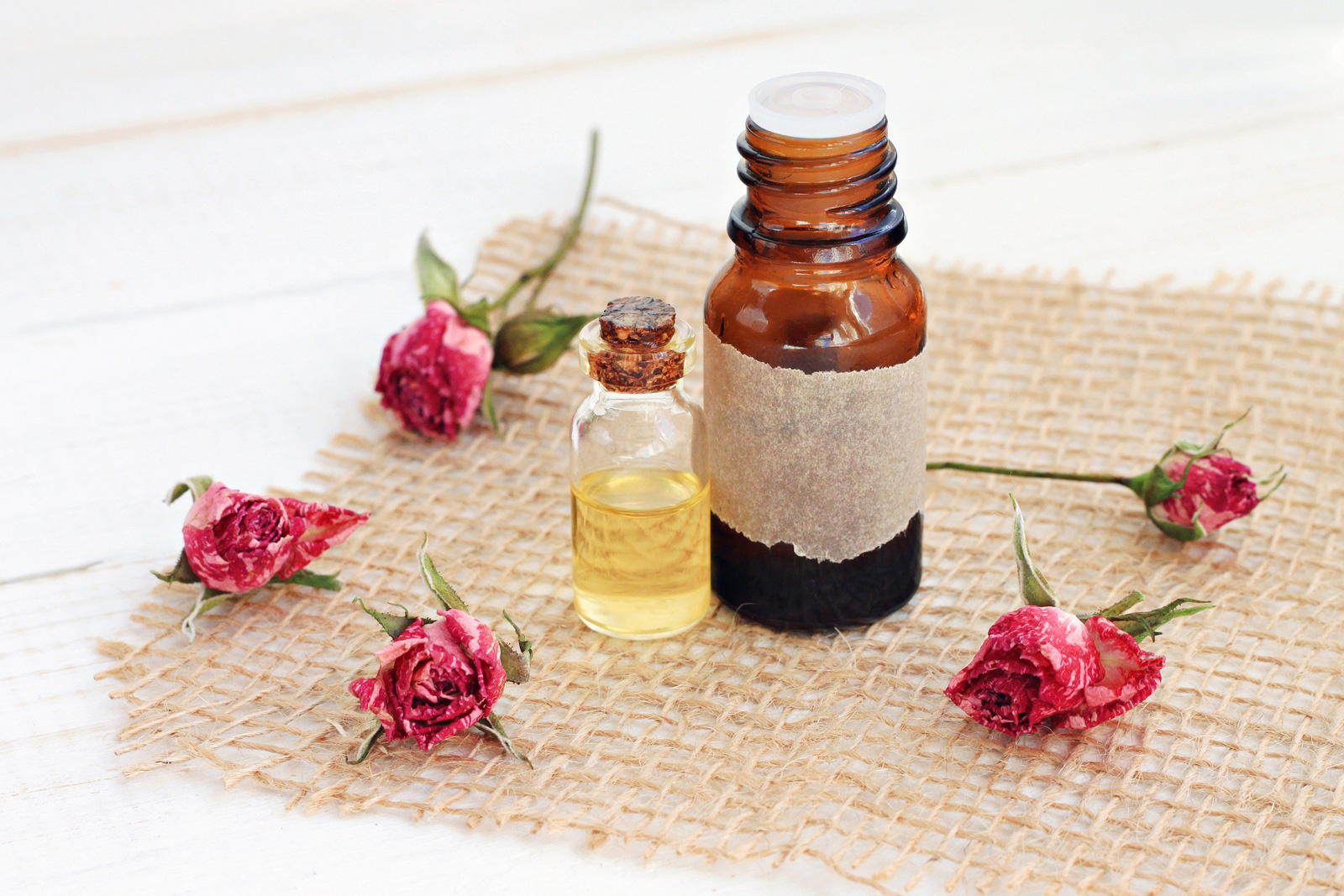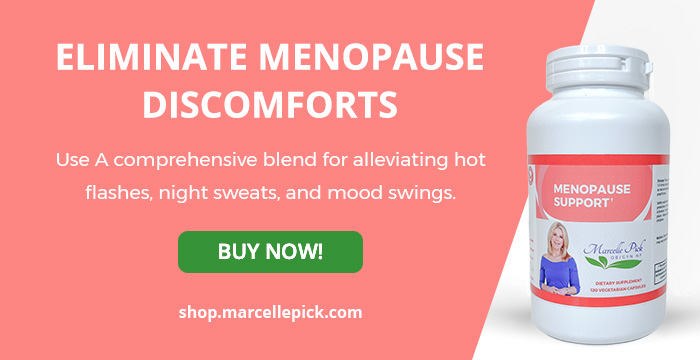Have you ever noticed the impact a scent can have on your mood? I’ve experienced this so often – with a deep breath of ocean air, or the earthy smell of a forest when I’m hiking, I can feel my body calming and my mood lifting.
The power of scent is just one of the ways that essential oils can impact your health. So many people are talking about essential oils these days as a natural healing method that can have a positive effect on so many aspects of your health. Have you tried them yet? If not, maybe it’s time!
So many women come to see me about difficult symptoms related to hormonal imbalance. I’m not just talking about PMS or menopausal symptoms either, though those are certainly problems for many women. The constant stress of daily life brings more and more women to me who are overloaded with cortisol, the stress hormone, or have been battling stress so long that their thyroid and adrenal glands aren’t functioning at all in the way that they should.
Essential oils can help with restoring hormonal balances and good health. As part of a healthy lifestyle, which includes stress reduction, good quality sleep, and a nutritious diet, essential oils can really make a difference. Let’s take a look at how.
What Are Essential Oils?
Essential oils are all natural oils made up of a complex mixture of natural chemicals that are extracted from certain parts of plants – leaves, barks, rinds and herbs. There are a few different methods that can be used to extract and concentrate these oils – distillation with water and/or steam, mechanical processing known as expression (unique to citrus peel oils), or a process called maceration, which is only used on a very limited number of plants.
After distillation, the oil is separated from the water, so it’s truly pure oil. That makes these oils extremely concentrated – and very powerful. A little goes a long way, and very few essential oils should be used in the fully concentrated form.
Why So Many People Are Talking About Essential Oils
Research on the impact of essential oils is limited, but there are some studies that show some positive benefits, particularly on hormonal activity. If there aren’t a lot of solid studies that prove the benefits, why are so many people touting essential oils for healing? Quite simply, it’s because they work for them!
One of the most important things you can do for your health is reduce stress – and pleasant scents can help that happen. Your olfactory bulb is connected to the part of your brain responsible for emotional reactions, the amygdala, as well as to the hippocampus where memories are stored. Psychological studies have revealed the power that scents have over positive or negative associations – and those associations can activate the release of both “feel-good” hormones and the stress hormone cortisol, which can make you feel lousy.
Conventional practitioners rely heavily on prescriptions to make you feel better. But if something might help you feel just as good without chemical intervention, wouldn’t you want to give it a try? No intervention will work for everyone. We are all such unique individuals – what works in one way for some may have the opposite effect in others. But there is little to no risk in using essential oils, if used properly, so what’s the harm in giving it a try?
How Do Essential Oils Help With Hormonal Imbalance?
I hope I’ve convinced you to keep an open mind and learn more about how essential oils might help you feel your best. Let’s look at how essential oils can work on hormonal imbalances to get you on the right track again.
What is Hormonal Imbalance?
Hormonal imbalance is exactly what it sounds like. Your body has multiple hormones, all with a specific task to carry out, and if the levels of any of these are too high or too low, your body can suffer. Additionally, if the ratio of some hormones to others is out of whack, you might experience uncomfortable symptoms.
There are so many hormones in your body that carry essential messages to so many systems. And it’s not just the sex hormones that everyone thinks of immediately, though of course those are important. Imbalances in estrogen, progesterone and testosterone can be responsible for the uncomfortable symptoms women experience in menopause – hot flashes, fatigue, weight gain – and during their menstrual cycle.
Equally impactful are cortisol, insulin, thyroid hormones, and human growth hormone (Hgh). If you have too much or too little of any of these hormones, your health can really suffer. Symptoms might include weight gain, extreme fatigue, depression, anxiety or other mood disorders, insomnia, headaches, and fertility problems. Prolonged imbalances in vital hormones can cause adrenal and thyroid dysfunction, which can lead to more serious conditions. That’s why it’s so important to do anything you can to even out your hormone levels.
Related article: Thyroid Symptoms in Women – Causes and Natural Treatments
What Causes Hormonal Imbalance?
Hormones are sensitive, and there are so many factors that can impact your levels that it’s hard to answer this question. That’s why we have to look at the whole picture when we are assessing our health. When your lifestyle is as healthy as it can be, your body is far more able to keep up with producing the proper amount of hormones for every situation. But when derailed by factors like chronic stress, exposure to toxic chemicals, poor diet and sleep deprivation, your body is likely to experience a breakdown somewhere; and that’s usually in hormone production and signaling.
Take cortisol, for instance. When your adrenals are constantly pumping out cortisol, they stop production of other “less important” hormones – like estrogen and progesterone. That’s because survival takes precedence over reproduction in times of stress. But our stress these days goes far beyond survival – we are stressed over work, children, aging parents, and trying to do it all. And our body can’t tell the difference!
A healthy lifestyle is your best defense, and reducing stress is key to maintaining good health. That’s where essential oils can come in. Here are some of the top essential oils for hormones.
7 Great Essential Oils for Balancing Hormones
There seems to be an essential oil for everything, but these seven are particularly good for restoring and maintaining hormonal balance.
1. Clary Sage
A number of studies, albeit small (and many on animals rather than humans) have shown the impact that clary sage essential oil can have on hormones. One study showed that cortisol levels in participants were reduced by 36% and serotonin (a neurotransmitter linked to mood) levels increased after inhalation of clary sage oil. Other research has shown that clary sage essential oil can improve thyroid hormone levels, and balance estrogen in your body by distributing it evenly. This is a big deal because so many issues women face are in part due to excess estrogen, and so many things in our food and environment can raise estrogen levels. And that’s not all. Research has also shown aromatherapy to be effective for relief of menstrual cramps. In fact, some preliminary research found aromatherapy massage which included clary sage to be more effective on menstrual pain than acetaminophen. And study in 2010 found that inhalation of clary sage oil reduced blood pressure in 34 female patients. That’s a lot of good reasons to give it a try.
2. Frankincense
When it comes to balancing out functioning of T3 and T4, the thyroid hormones, frankincense essential oil is a great bet. This oil has been shown to reduce inflammation and decrease cortisol, which has a big impact on proper thyroid functioning. And because inflammation is tied to autoimmune diseases, frankincense is a great bet to soothe these symptoms as well. Although research is again limited, frankincense has been used, with success, to reduce symptoms of menstruation and menopause, such as pain, constipation, anxiety, nausea, headaches and mood swings. This oil may also help with regulating production of estrogen.
3. Lavender
Lavender essential oil has been well researched and shown to have a beneficial effect on hormonal balance, pain relief, stomach trouble, headaches, and reducing feelings of depression and stress. Lavender lowers the amount of cortisol released by the adrenal glands. One study out of Wesleyan University showed that using lavender oil therapeutically can boost the percentage of deep, restorative slow-wave sleep in men and women. Other research demonstrates that inhaling lavender can soothe symptoms of depression and the emotional swings that come with PMS. Because it’s an adaptogenic oil, lavender can be particularly useful in hormonal balance because it can adapt to the specific needs of your body. So if one hormone is too high, but another too low, lavender might be able to help level out both without adverse side effects you might get from prescription remedies.
4. Peppermint
This one may come as some surprise, as it isn’t typically used for PMS or other issues around menstruation. But peppermint oil has been shown to have an impact on hormones that impact mood, so it’s use can help your emotional healing, which in turn can help keep those hormones stable. Headaches often accompany hormonal shifts, and inhaling peppermint oil can help reduce this pain. In fact, one study showed that use of peppermint oil had the same impact as taking 1000 mg of acetaminophen, without the potentially dangerous side effects that come with the use of too much of the drug. Peppermint oil can also help you keep a clear head instead of succumbing to the “foggy brain” that so often accompanies hormonal imbalances.
5. Rose
Rose essential oil balances testosterone levels in your body, which is important for women as well as men. Rose is also known as an aphrodisiac, which can aid in boosting your libido. A study in 2009 also showed that rose essential oil promoted greater feelings of calm and relaxation than the placebo, which can help in balancing cortisol and supporting the adrenal glands. Finally, rose essential oil has demonstrated ability to decrease blood pressure and breathing rate, improve serotonin levels and other neuropeptides, further promoting a sense of calm.
6. Rosemary
Because excess estrogen can have such an impact on issues like infertility and some cancers, and rosemary essential oil can remove excess estrogen from your body, it’s a great aid in healing hormonal imbalances. Research has detailed the many benefits of rosemary, including lowering cortisol in saliva, anti-cancer properties, improving memory and impacting mood. What makes rosemary so effective? Many says it’s the antioxidant activity of its chemical composition.
7. Thyme
Thyme essential oil impacts hormonal balance by raising levels of progesterone. Since infertility is correlated with low progesterone levels, PCOS and depression, and can also impact the levels of other hormones, thyme oil can be a big help in restoring balance. Research has demonstrated this balancing effect, and it’s certainly less risky than seeking out synthetic hormone replacement, which often comes with severe side effects.
How Do I Use Essential Oils?
Essential oils are potent, and most shouldn’t be used in pure, undiluted form. For topical applications, a few drops can be mixed with a carrier oil – so many work, including olive oil, coconut oil, jojoba and sweet almond oil, along with many others. There are some great suggestions for carrier oils here.
Oils can be used topically as lotions or massage oils, depending on which carrier it’s mixed with. They can be added to bath water, and of course, one of the most common ways to use essential oils is to mix a few drops with water in a diffuser and inhale the scent in the air.
Most should not be ingested; they are so much more concentrated than what you would find in an herbal tea. It’s always a good idea to work with a certified herbalist or health care professional before adding any new therapy to your routine.
Be Sure You Are Getting Pure Oils From Reputable Sources
There are a lot of companies selling their wares, particularly online. My rule of thumb is that if the price seems too good to be true, it probably is. The last thing you want is to inhale or absorb through your skin a bunch of additives or other chemicals that could make your hormonal imbalance worse, not better! Read labels carefully, research companies, and pay attention to what you are purchasing.
Related article: Chemicals in Our Cosmetics: It’s Not Pretty!
Some people – particularly pregnant women or those with serious health concerns – should not use essential oils. As I said before, it’s a good idea to work with a professional, particularly if you have any specific concerns. While most essential oils don’t come with side effects, because we are all individuals with our own sensitivities, it’s a good idea to test an area on your skin before applying essential oils in any form.
Breathe Deeply and Make Use of Essential Oils for Hormones!
Like I said at the beginning of this article, scent can quickly bring me to my happy place. And, as I’ve shown you here, it can do that for you too! With the right research and high quality, organic oils, you can soothe your stress, balance your hormones, and feel great again – naturally!
References:
https://wellnessmama.com/26519/essential-oils-risks/
https://wellnessmama.com/59952/essential-oils-for-hormone-balance/
https://www.naturallivingideas.com/9-essential-oils-for-hormonal-imbalance-how-to-use-them/
https://draxe.com/essential-oils-for-hormones/
https://naha.org/explore-aromatherapy/about-aromatherapy/what-are-essential-oils
http://nymag.com/strategist/2017/02/best-essential-oils-benefits-monq.html









